Hands-on Review – The new MB&F LM1 Silberstein – Primary colours and basic shapes for a complex design (Live pics, specs & price)
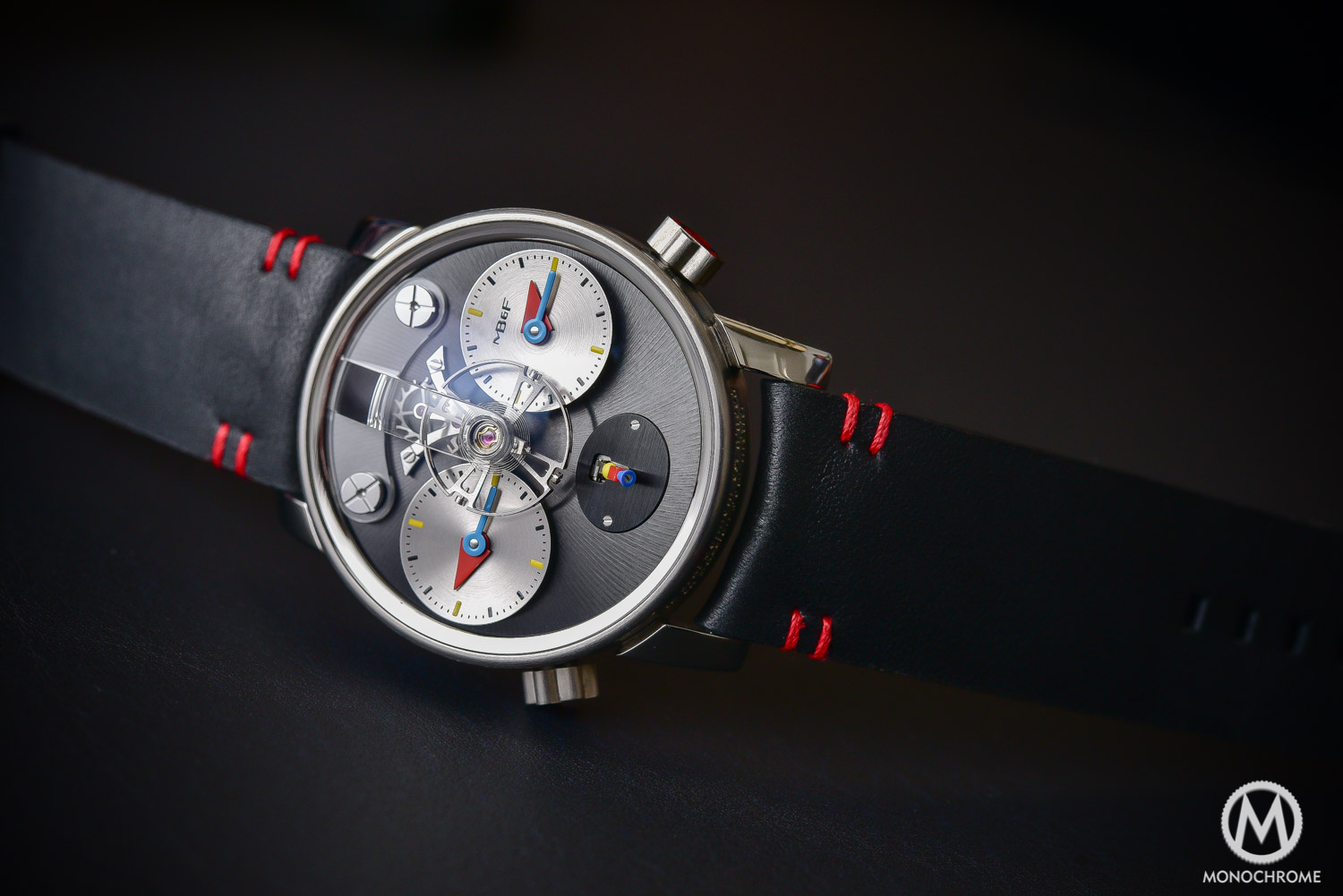
Now that the brand is over 10 years old, you probably are aware of the fundamental concept behind MB&F, Maximilian Büsser and Friends. The concept of friends, or let’s say partnerships, has always been extremely important in the development of the watches, which are not the brainchild of a single man but a meeting of several people: designers, watchmakers, suppliers… Even if MB&F recently moved to a greater integration in the development and manufacturing process, there are still some good friends around. And the latest collaboration just gave birth to a very bold watch, the MB&F LM1 Silberstein, of course made together with the legend Alain Silberstein.
Alain Silberstein is a French artist/watch designer. He was born in 1950 in Paris, France. After graduating with a diploma in interior architecture and model making, he worked first as an interior designer in Paris, then continued in that field after moving to Besançon in 1979 ? the centre of France’s watchmaking industry. Silberstein felt in love with watchmaking and in 1990, he founded his own brand, Alain Silberstein Créations, which ceased operations in 2012.
Silberstein’s watches are known for the signature use of three bright primary colours (red, blue, and yellow); three simple geometric shapes (triangle, square/rectangle, and circle or in three dimensions pyramid, cube, and sphere); and sophisticated juxtaposition of materials and finishes. Silberstein was the first to create a watch with a sapphire crystal case, and he was a pioneer in making haute horlogerie playful with his use of bright colours and non-traditional materials. Silberstein now works as an independent watch designer.
Not the first MB&F x Silberstein watch
In November 2009, MB&F (which was already 4 years old and which already had quite a few watches in the catalogue) introduced a very limited edition – what the brand calls the Performance Art pieces – designed not only by Max Büsser and Eric Giroud (well, they created the normal edition, on which this limited version was based) but in partnership with a talented horological designer, which also had his own brand: Alain Silberstein. Based on the rectangular HM2, the HM2.2 BlackBox was mixing the look of the HM2 with the colorful Bauhaus-inspired style of Silberstein.
The MB&F HM2.2 BlackBox was an entirely black rectangle. Entirely, not really. The design has been tuned down by Silberstein, who kept only the basics: a rectangular case with two highly simple dials (one for the date, one for the time – retrograde minutes & jumping hours). Several coloured accents come to enlighten the design, such as the red tracks and hands and the logo of Silberstein: a blue square, a red triangle and a yellow dot. You have the fundamental design concept here. Silberstein plays with basic shapes and primary colours to create complicated designs. And that’s exactly what you’ll find back on the new creation of MB&F, the LM1 Silberstein.
The MB&F LM1 Silberstein
The 3 editions of the MB&F LM1 Silberstein – Titanium – Black-coated titanium – frosted gold
What is the MB&F LM1 Silberstein? It is basically a LM1 reviewed and re-issued by Alain Silberstein. Thus, the Silberstein edition shares all the technical details and specifications with the LM1 – floating balance, double independent display of the time, movement shaped like a pocket watch and finished according to Kari Voutilainen – but even if close, every single detail is different. It looks the same without being the same. Not a single major part has been kept identical. Every detail has been shaped, coloured or finished differently. It really is a strong lifting… Placed one next to each other, these two LM1 are very close… at least at a first glance. Then, if you look closer, you feel major differences. One is a demonstration of “steam-punk“, the other one is… A Silberstein creation, a sort of Bauhaus UFO.
What makes this MB&F LM1 Silberstein so different from a classical, non-limited LM1, without being completely a stranger? First of all, the dial. Right, the layout that makes the LM1 so special and so balanced is kept. We find back the same display, based on four elements: two completely independent dials for the time, a vertical power reserve indicator at 6 and a large bridge starting at 12 and holding the large floating balance wheel, placed right in the middle of the watch. However, look at all of these parts. To the exception of the main plate (at least on the titanium editions… the gold edition has a unique frosted gold plate), with its dark grey colour and snailed brush, and the escapement module, nothing is the same – but still at the same place (as a proof of the technical filiation of these two watches).
The two dials displaying the time used to be flat and coated with several layers of translucent white lacquer – giving a milky / antique look. They used to have Roman numerals and classically-shaped blued hands. Now, they are concave – meaning that they show a sort of bowl shape – they are now metallic and finished with a concentric graining. The colours and shapes of the concave hands (to follow the curvature of the sub-dials) highlight Silberstein’s approach of the design. The three primary colours can be found on the sub-dials – red and blue hands, yellow index markers. This gives echo to the power reserve indicator, shaped like the signature logo of Alain Silberstein – a miniature superposition of a blue cone, a red cube and a yellow sphere. The indications of the MB&F LM1 Silberstein are the same as the normal LM1: the rate keeping of the twin dials is controlled by the same regulator (balance and escapement) so that once set, the two times stay perfectly synchronized with each other. Both the hours and minutes on both dials can be set to any time desired via their respective crowns, giving access to two totally independent time-zones.
The major update of the face concerns the large bridge that holds the massive (14mm) balance wheel. It used to be an opened double-arched on the classical LM1. It is now a three dimensional sapphire crystal bridge (remember that Silberstein was a pioneer in the use of this material). The function is the same but the shape is entirely different. Two large screws fix it to the main-plate. This sapphire bridge was a wish of Alain Silberstein – “nothing should break the view of the dial side regulator or block eternal time from reach-ing the time indications”. The manufacturing process is complex and because this bridge holds the balance wheel and the anti-shock device, tolerances must be low. Depending on the light, this sapphire bridge can be quite visible or almost absent, creating a new dimension on the dial of the LM1 and offering a better view on the star of the show, the fast ballet of the balance wheel and the escape wheel – but not too fast, as the movement beats at only 18.000 vibrations per hours.
The case of the MB&F LM1 Silberstein is also a strong evolution of the LM1. First of all – and this is not just a detail – the watch becomes smaller. From a hefty (but justified in the context of the LM1) 44mm, the case of the Silberstein edition goes down to 42.5mm (almost a classical diameter). This reduction has been made on the bezel and the side bands, which are now slimmer than before. The case also boasts new shapes. No more bevelled bezel and multiple-parts construction. The case is a single block, fully brushed and with a rounded profile around the highly domed sapphire glass. The crowns are still at 4 and 8 but also completely different in their shapes. One final detail can be seen in-between the lugs, at 6; a paraphrased quote from Gustave Flaubert: “Le vrai bonheur est d’avoir sa passion pour métier” – which translates roughly as, “Making a profession of your passion is true happiness”.
The LM1 Silberstein is already an entire collection, with 3 versions available – each limited to 12 pieces
- Titanium (non-coated), grade 5 quality, dark grey dial and silver sub-dials – 79,000 Swiss Francs (before taxes)
- Titanium, Black PVD-coated, grade 5 quality, dark grey dial and black sub-dials – 79,000 Swiss Francs (before taxes)
- 18k red gold, frosted gold dial and silver sub-dials – 88,000 Swiss Francs (before taxes)
On the wrist, the look and feel are completely different when going from the normal LM1 to the LM1 Silberstein. First, it looses its retro-futurist look (Max Büsser imagined the LM1 as the watch he could have designed if he were born in the 1860s and not in the 1960s) and gains a unique look, something that only the watches from Alain Silberstein have. It’s hard to describe, very weird in a way, not to everyone’s tastes for sure but it also has this idea of a real designer / artist’s work. Then, because of the reduced diameter, the watch feels easier to wear but doesn’t loose its appeal – we’ve always been strong promoters of smaller diameters here but the LM1 deserves some space, some wrist-presence. And because the dial keeps the same proportions and the case becomes slimmer, there is everything to gain for here.
As you’ve seen, there’s many aesthetic changes on the LM1 Silberstein. But what about the mechanics? Basically – and it’s no surprises – the movement is the same as a normal LM1. Except that, here again, the treatment applied is different. The LM1 used to have a traditional finish and look, with rhodium plated bridges and Geneva stripes. Here, MB&F applied the same concept as with the LM101 Frost. The bridges are still finished with great care – polished chamfers, including internal angles – and looking like an old pocket watch movement but the bridges are now finely frosted and plated in gold. Whether finished like this or like in the normal LM1, this movement is still a superb piece of watchmaking. Elegantly designed, greatly finished (look at the solid gold chatons and the chamfered wheels) and, even if more present in this golden finished, it’s not too demonstrative. The best is that, when looked quickly, you actually can’t noticed that a major part of the movement is missing: the regulating organ (as placed on the dial side). It never feels empty or amputated from a module.
Just like in the other editions of the LM1, it is conceived by Jean-François Mojon and Kari Voutilainen was consultant for the look and finish. This movement boasts 45 hours of power reserve (from a single barrel) and comprises 279 parts. Functions: two independent time-zones and power reserve indication (a unique vertical indication).
The MB&F LM1 Silberstein – Conclusion
With such a strong and unique design, we have to go over the usual “I love” / “I hate” feelings. Of course, like most of Alain Silberstein’s creations – and this also goes for MB&F, even if the LM series has always been easier in terms of design – many will think this watch is odd, strange or weird. There will always be some who will dislike such strong pieces. And we’d like to say: whatever! This MB&F LM1 Silberstein is not a consensual object. It’s even the opposite and that’s why we think it’s a superb watch.
The main question here concerns the evolution between the Steam-Punk-inspired LM1 and this coloured, Bauhaus-inpired edition that, with primary colours and basic forms, becomes a sort of complex artistic object. Everything is technically similar but on the other hand, every single aspect of the watch has been redesigned, re-shaped or re-finished. The filiation between the two watches is strong and at the same time, they are highly different. That’s why this watch, together with its audacious style, its superb movement and its exposed balance wheel, has to be applauded. In an industry where consensus and marketing rule, there are still some aliens to give us a smile.
Specifications of the MB&F LM1 Silberstein
- Case: 42.5mm diameter – 17mm thickness – grade 5 titanium OR black-PVD coated grade 5 titanium or 18k red gold – sapphire crystal on front and back – 30m water resistant
- Movement: Calibre LM1 – hand-wound – 45h power reserve – 18,000 vibrations/h – completely independent dual time zones displayed on two dials, vertical power reserve indication
- Strap: Black hand-stitched calfskin strap with black topstitched seams and 18k red gold pink-buckle – Black hand-stitched calfskin strap with red topstitched seams and titanium pink-buckle
- 3 x 12 pieces limited edition – 79,000 Swiss Francs (titanium) / 88,000 Swiss Francs (red gold) – before taxes

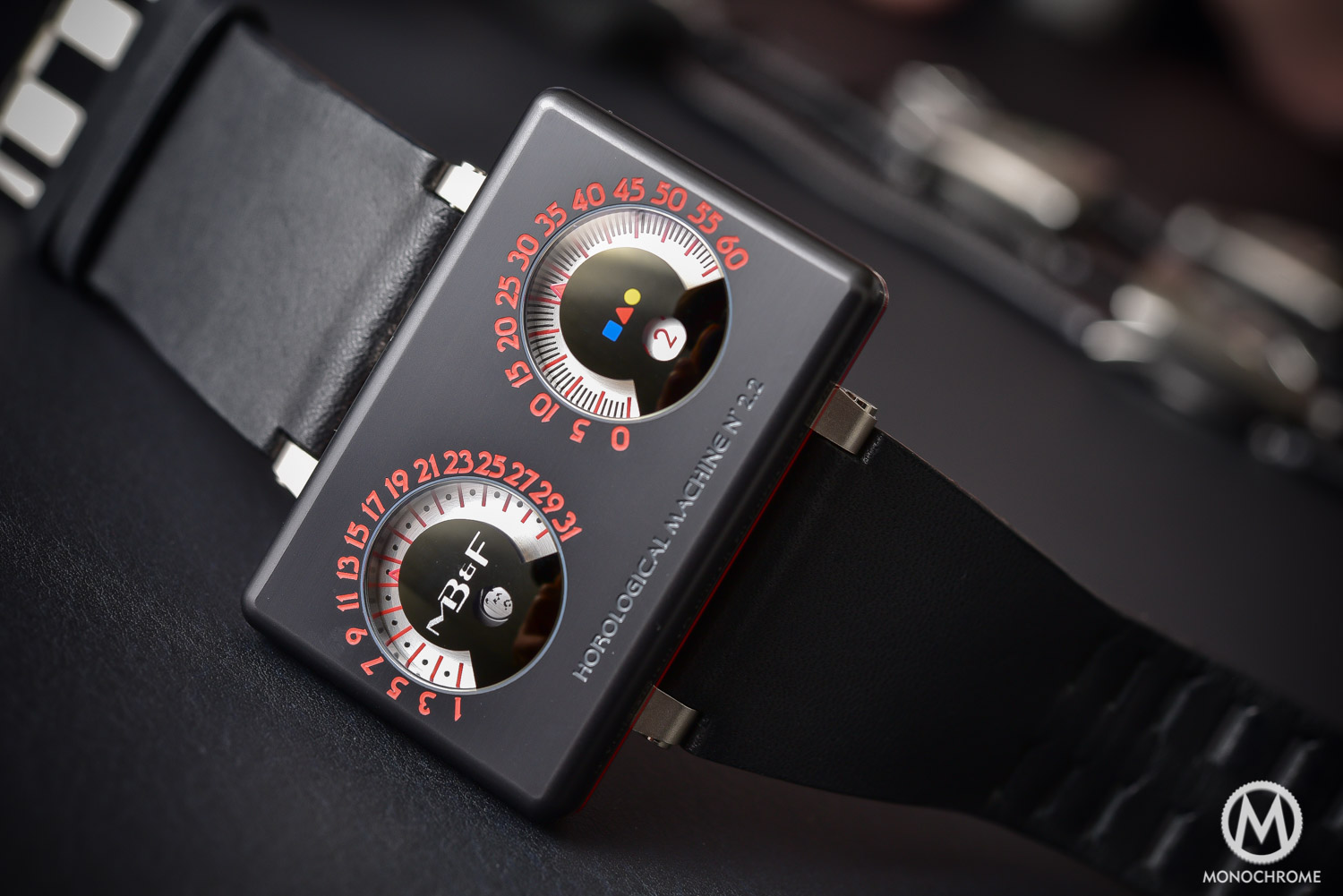
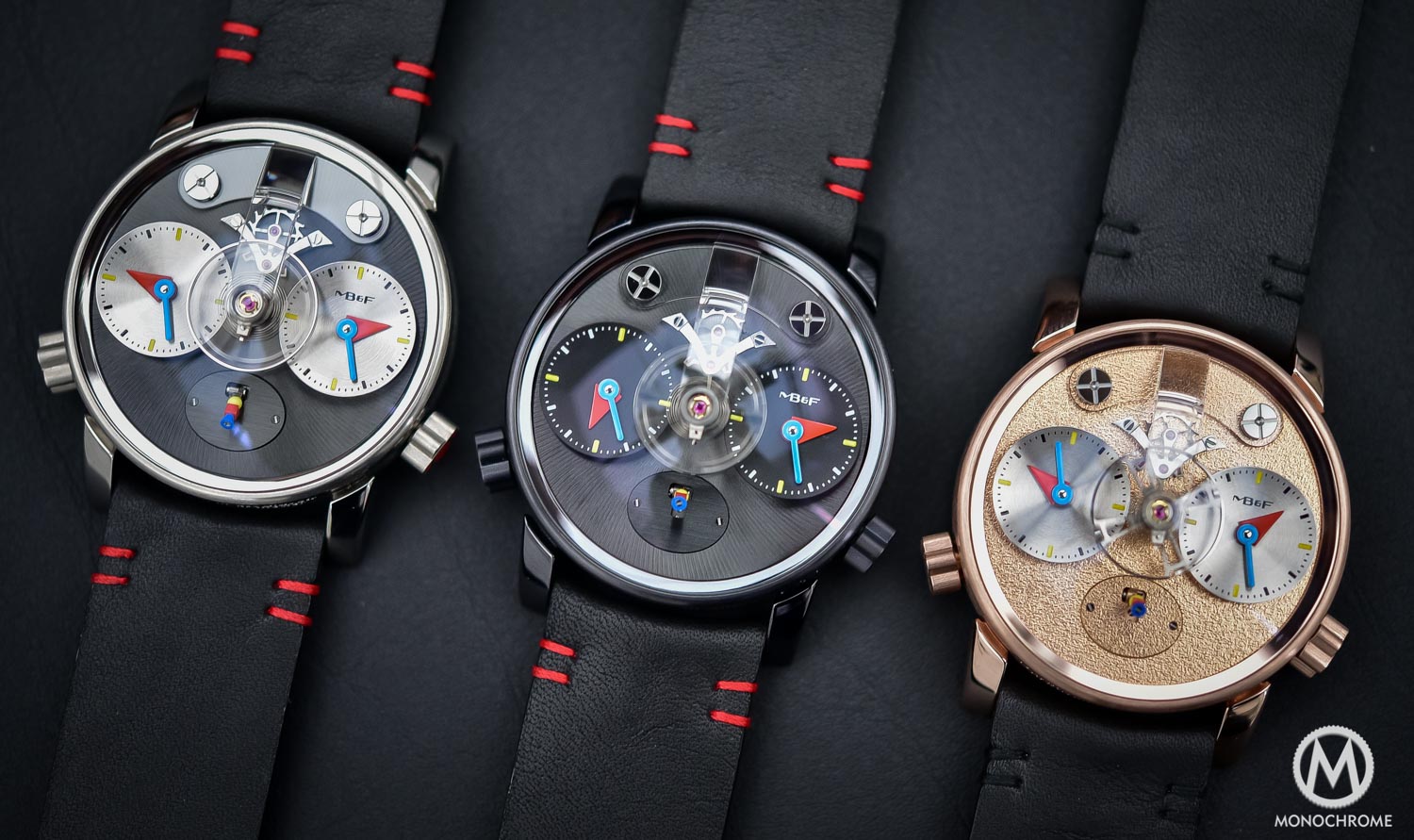
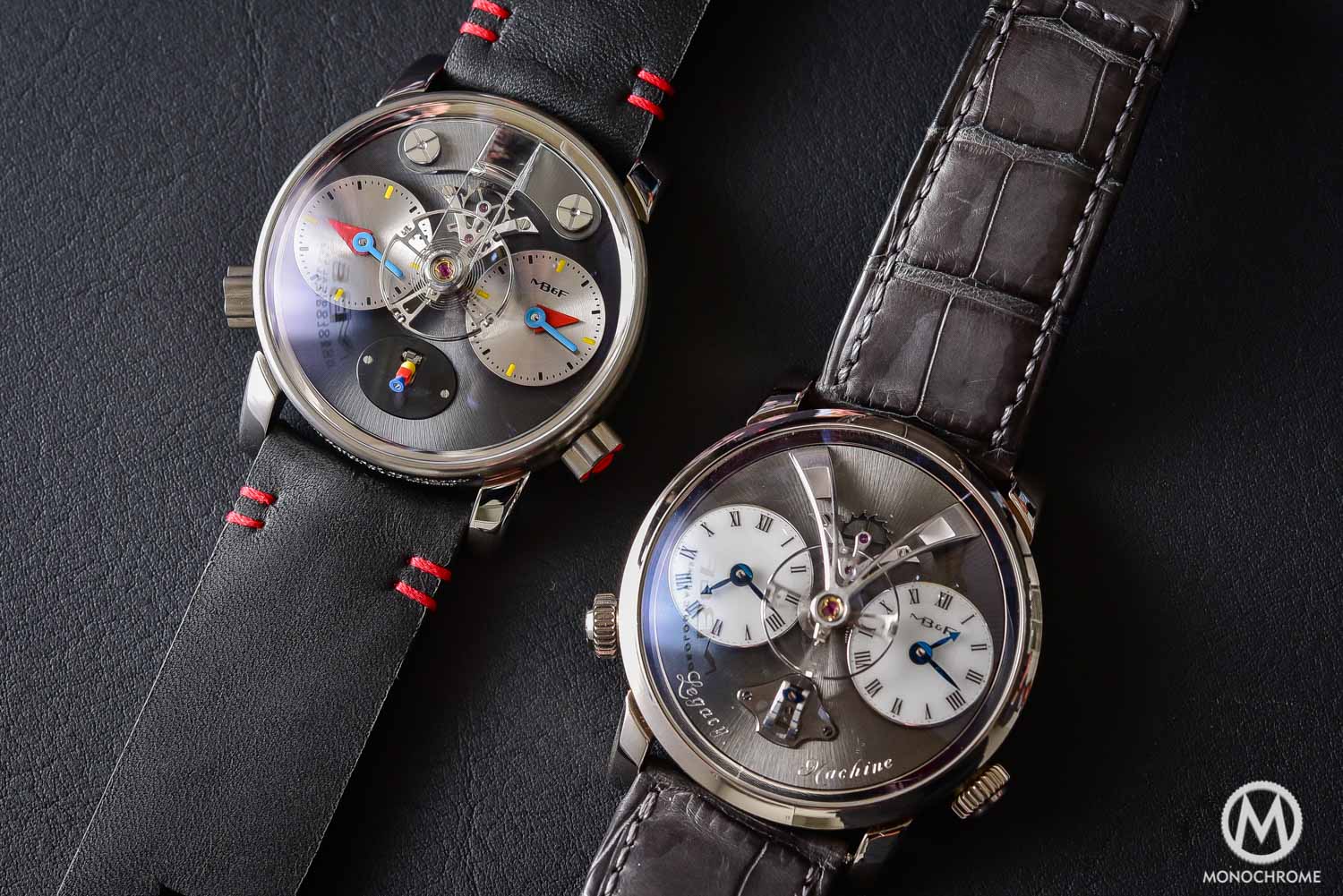
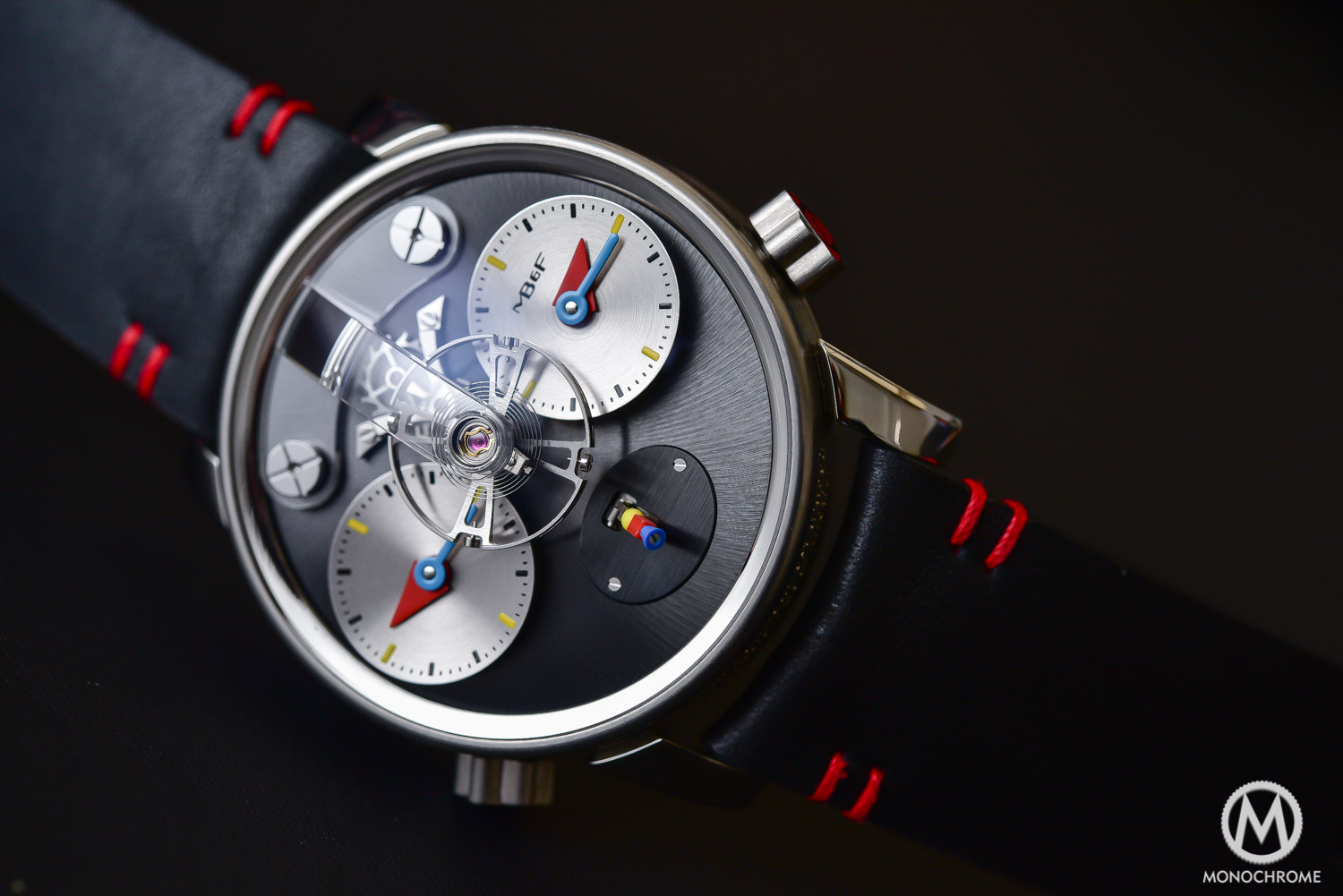
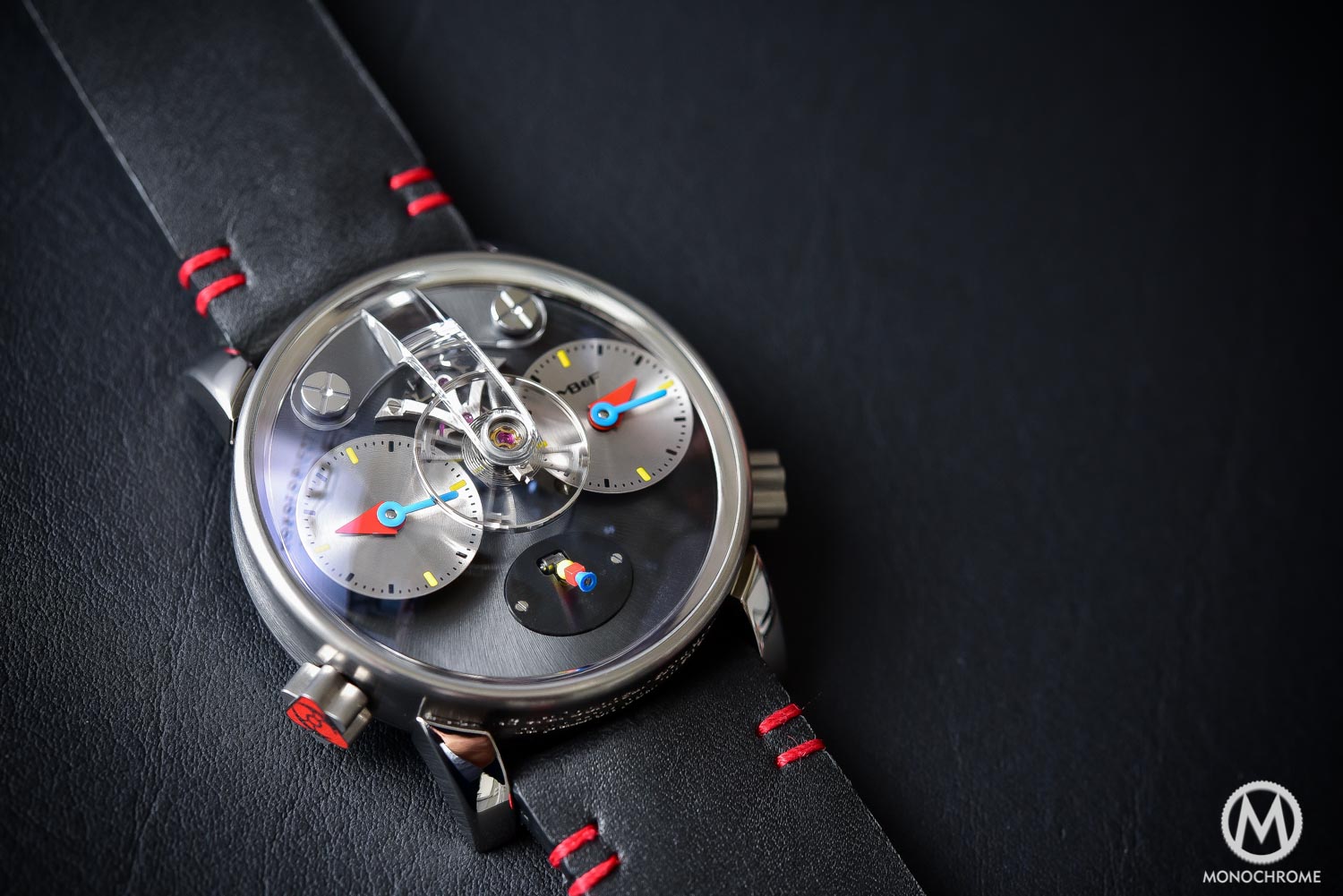
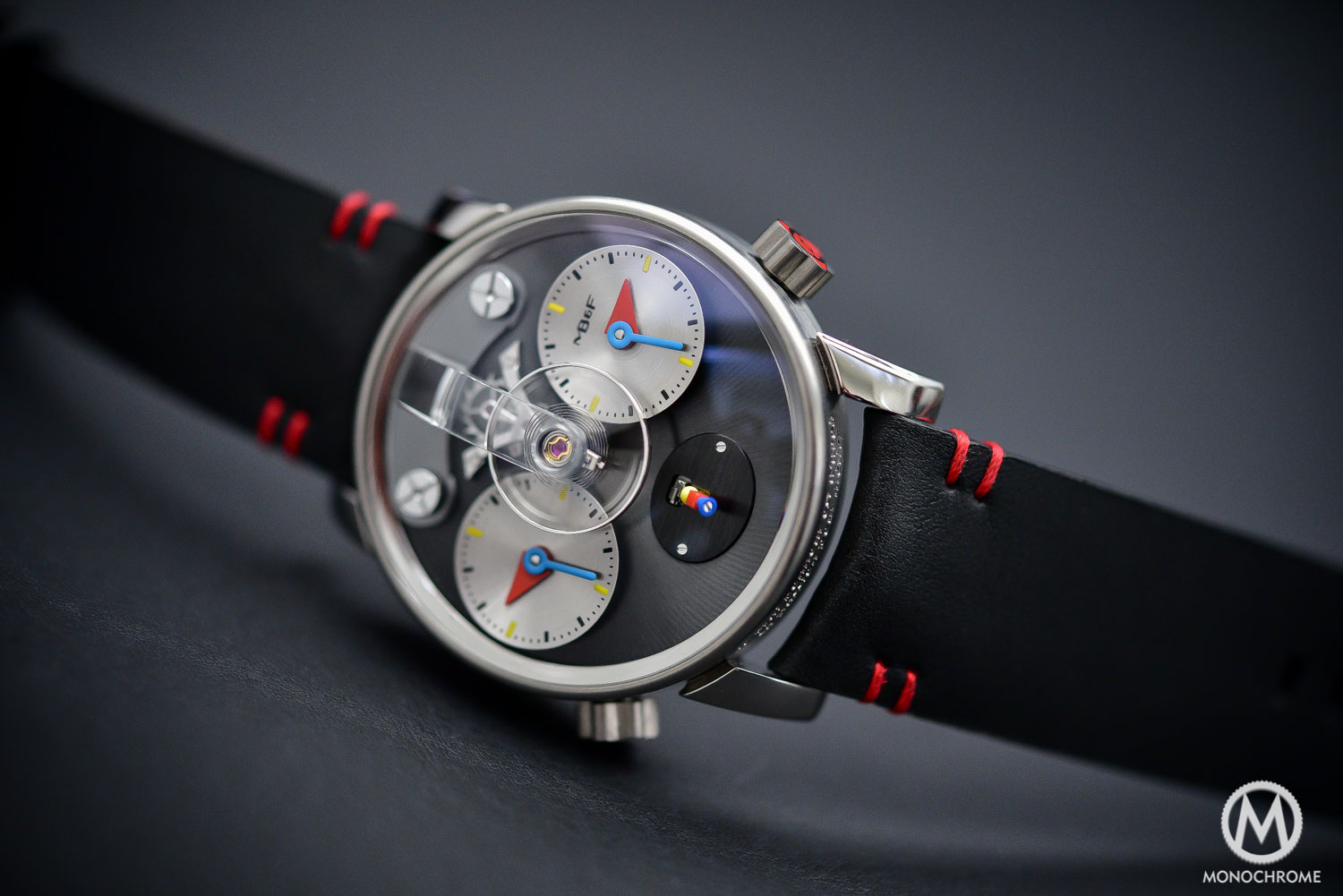
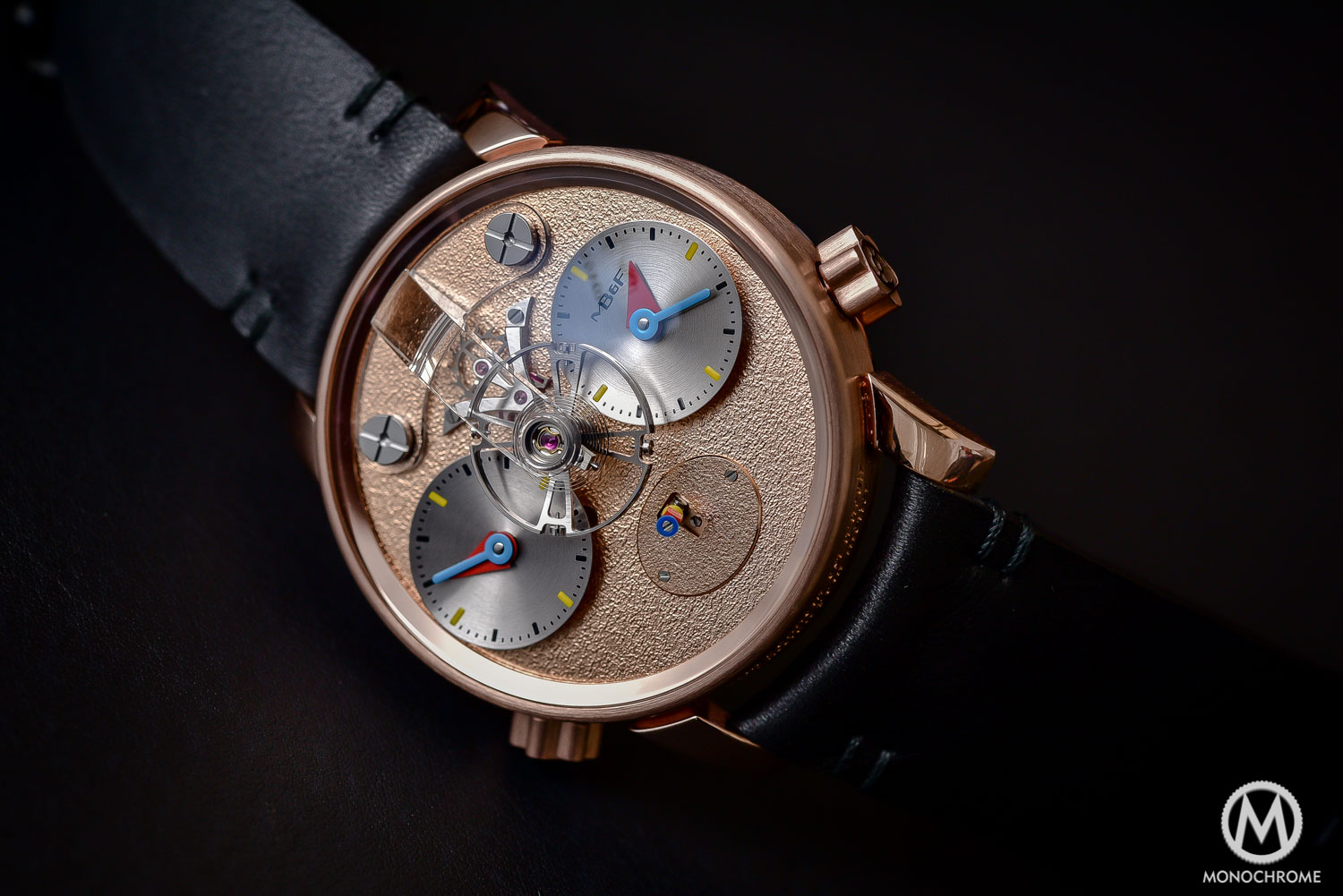
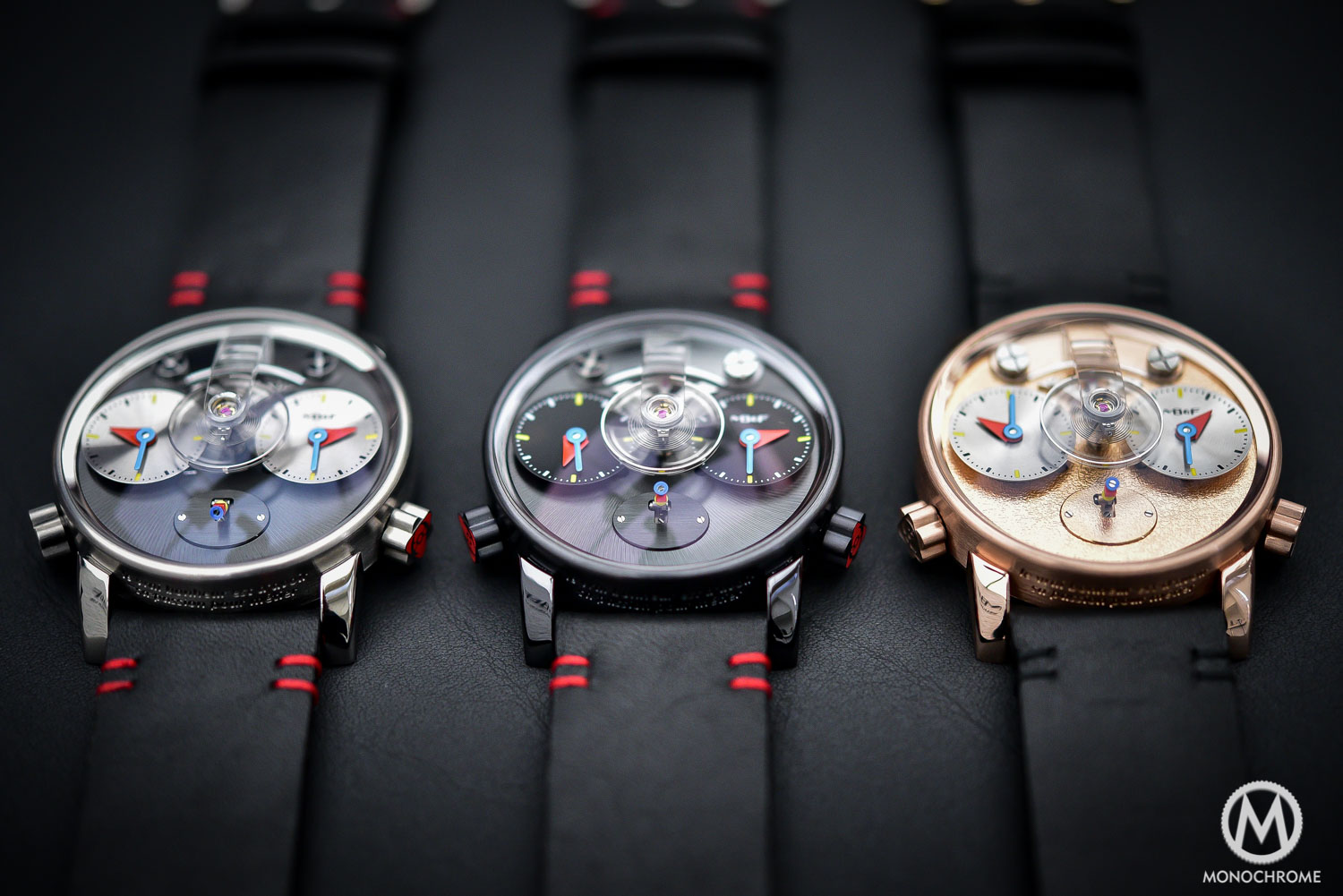
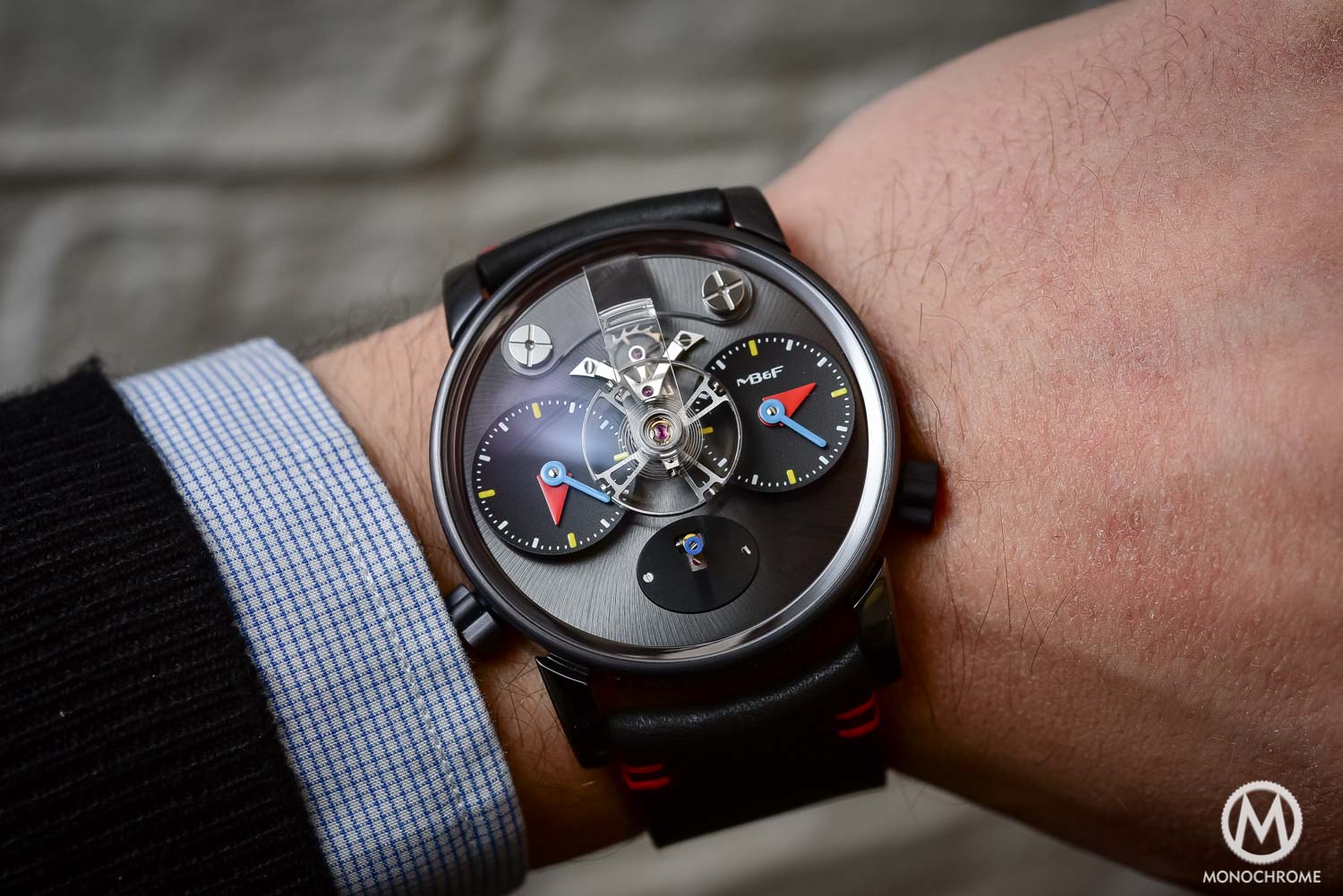
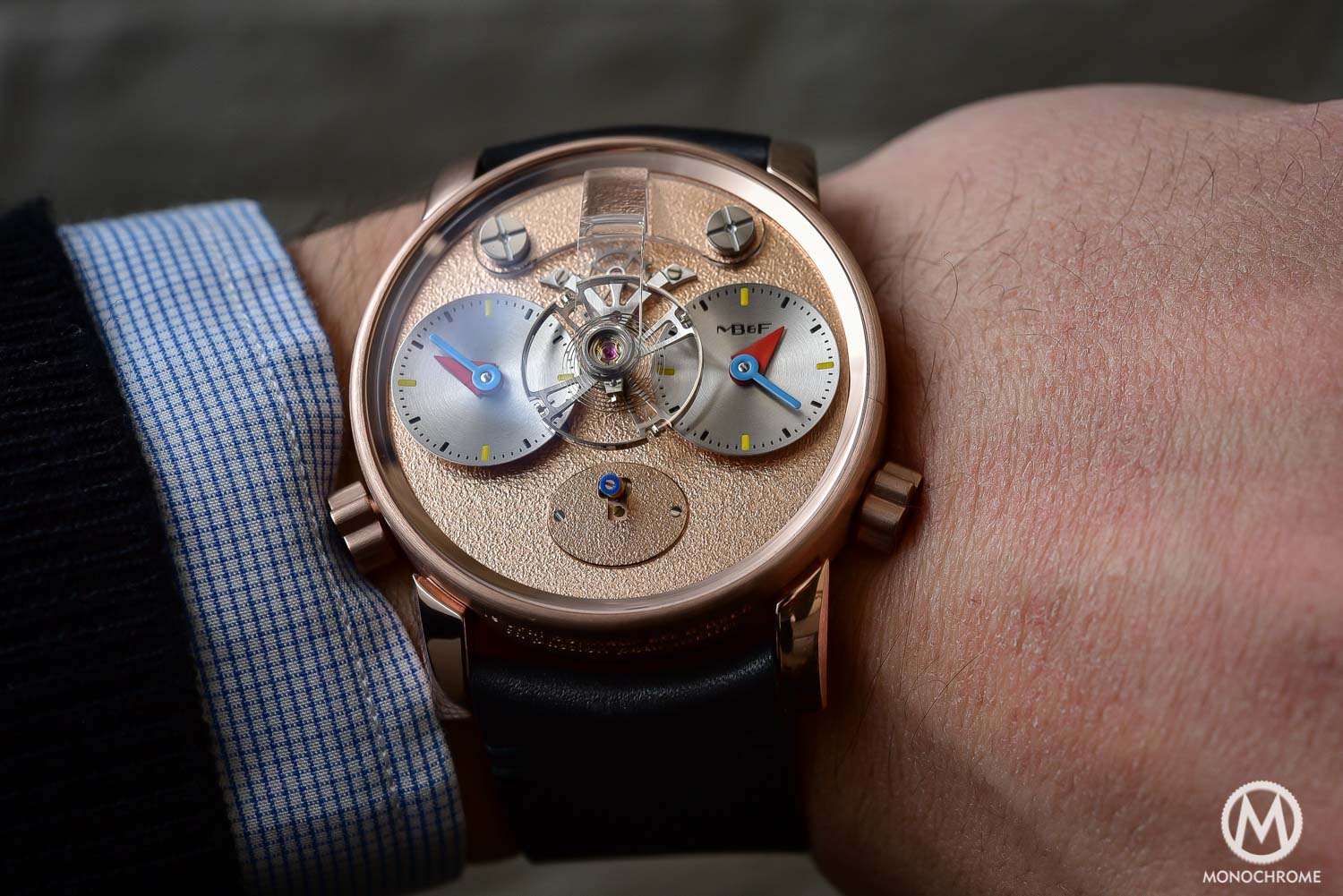
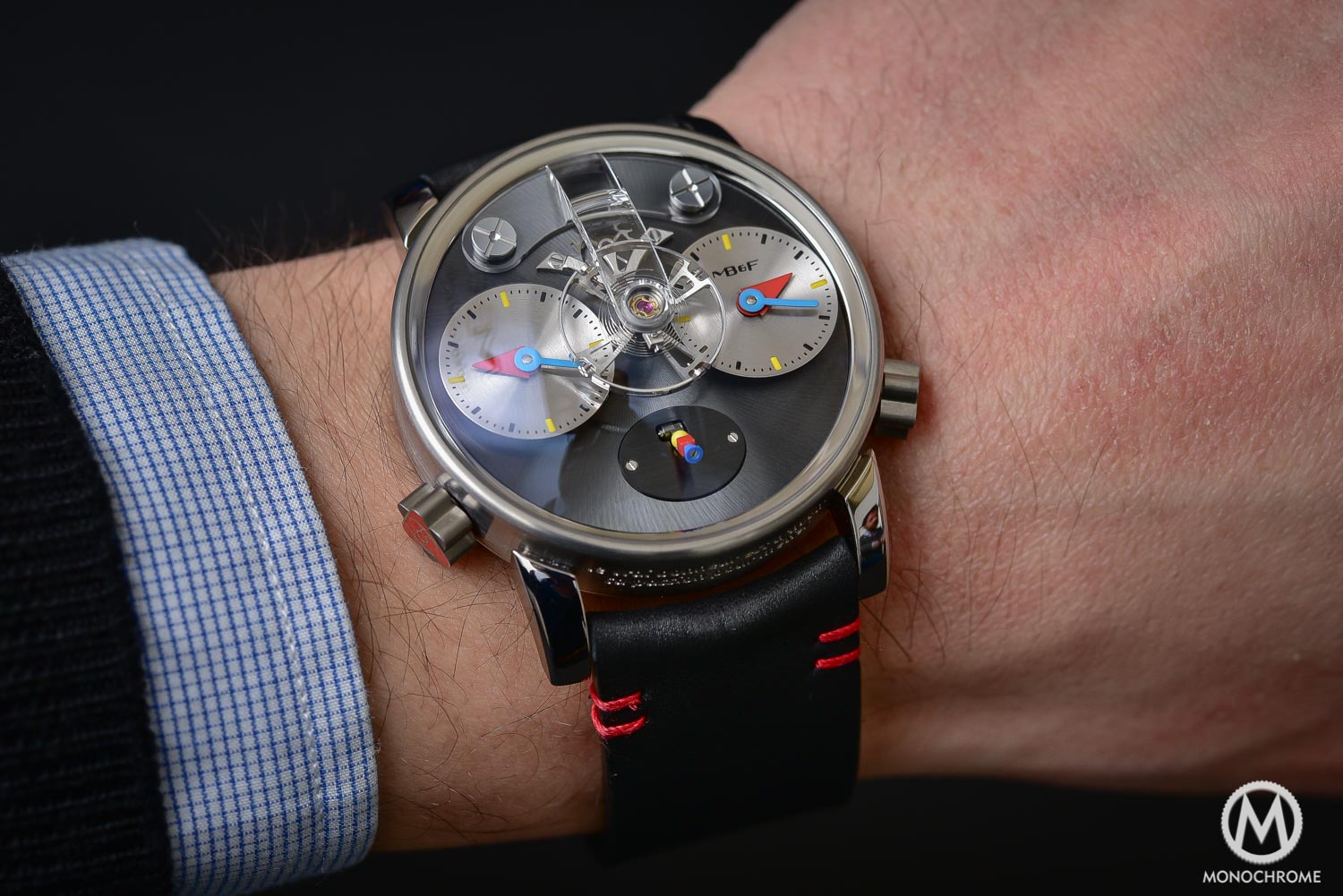
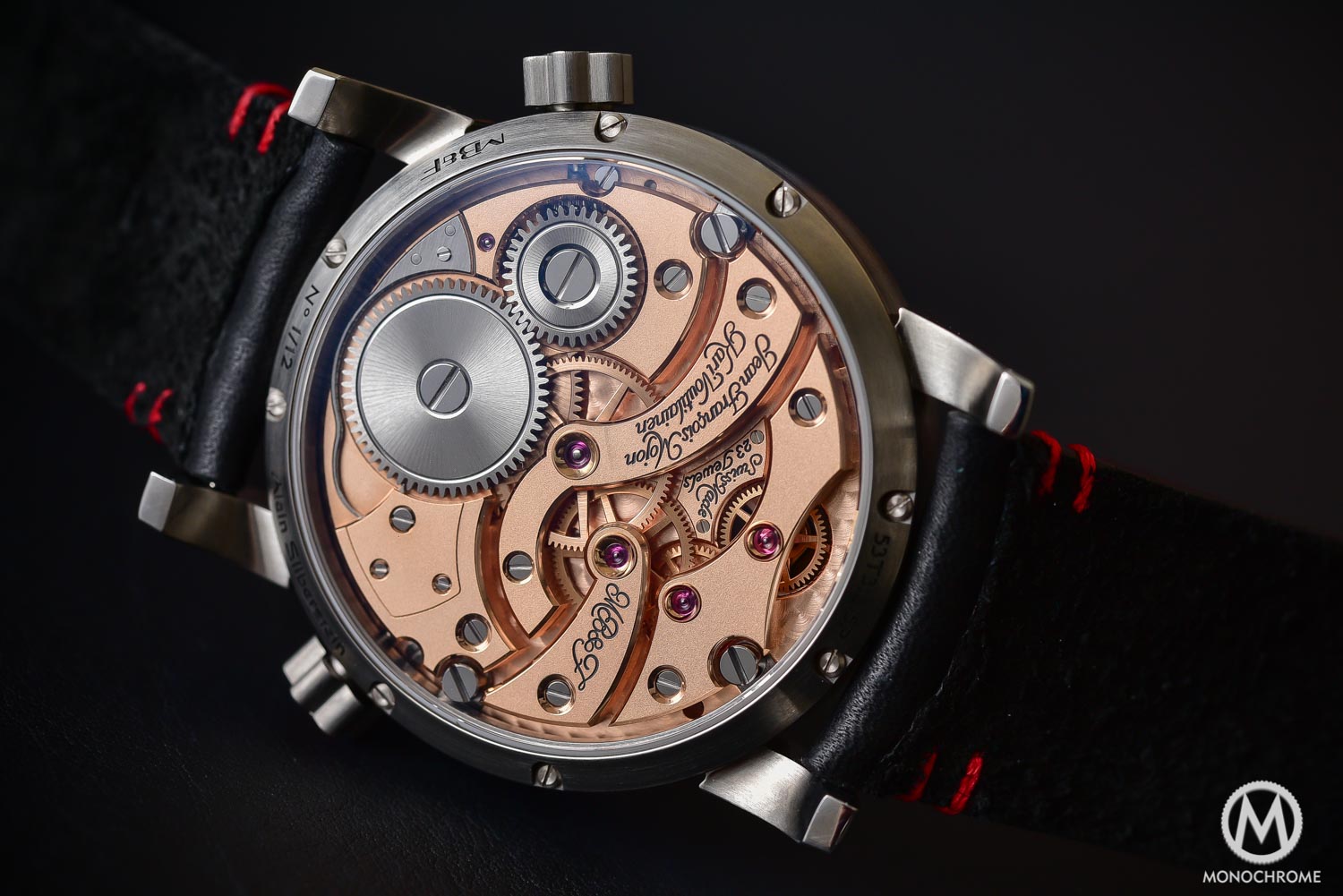
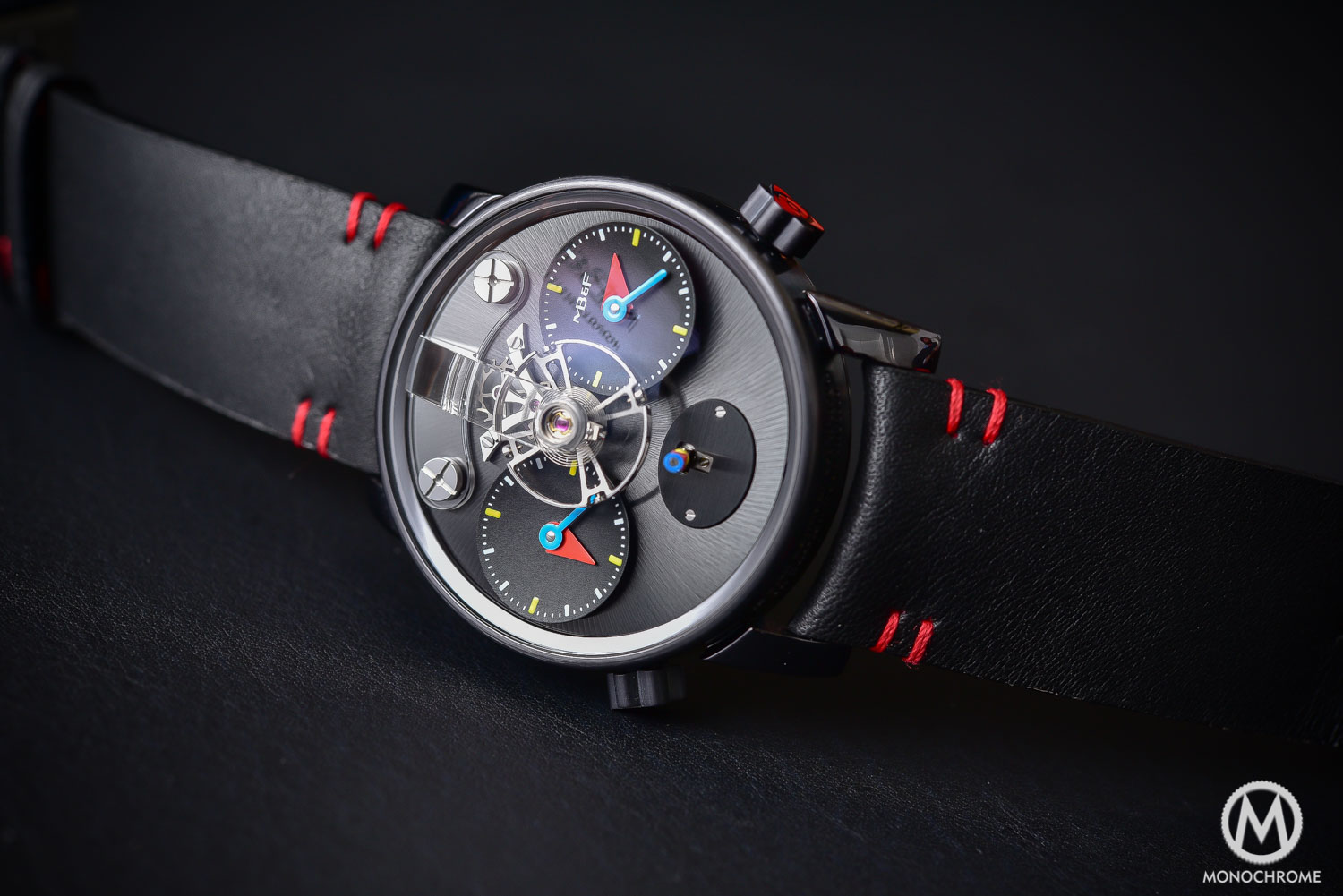
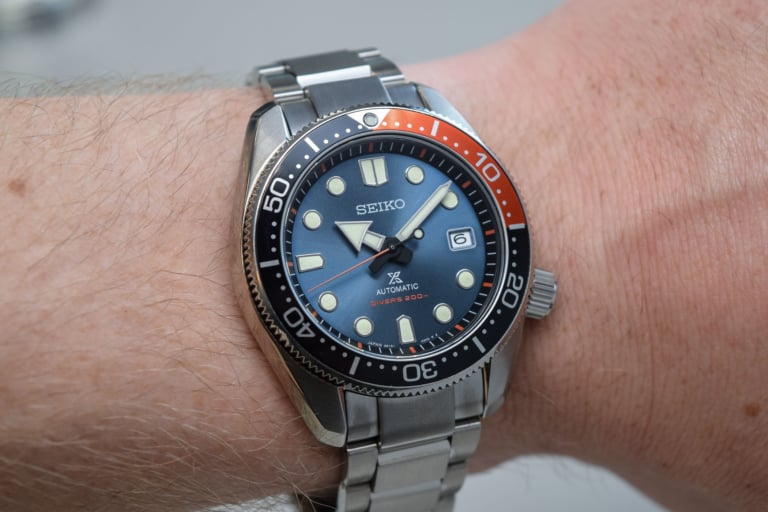
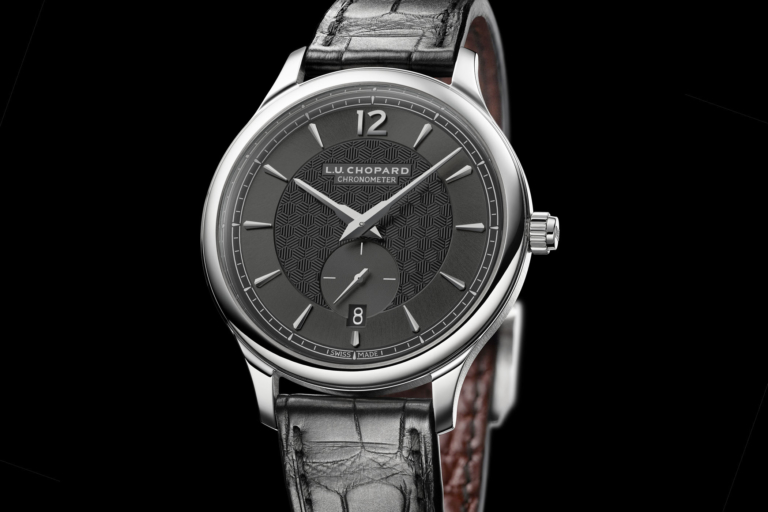
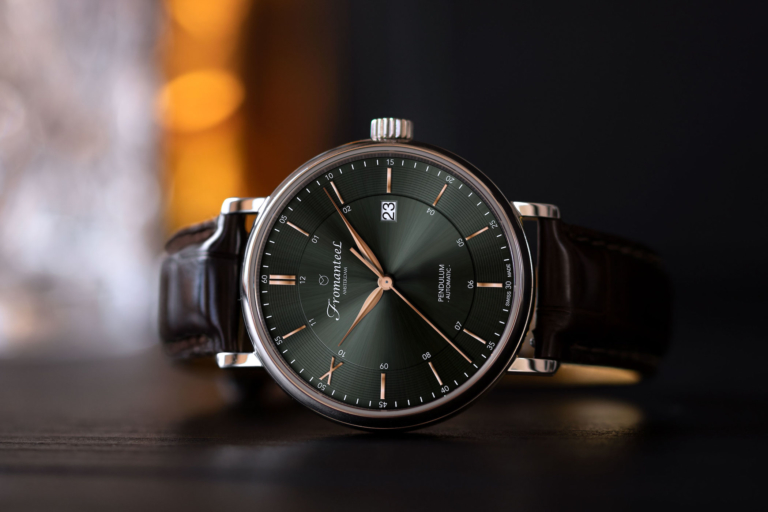
2 responses
What an ugly watch costing a bunch of money. A dramatic example of how a watch comprising a nice movement could be destroyed with a poor dial.
Well that’s only a matter of taste, I find this one as my grail! I love A.S. he’s so playful compared to the usual boring ones